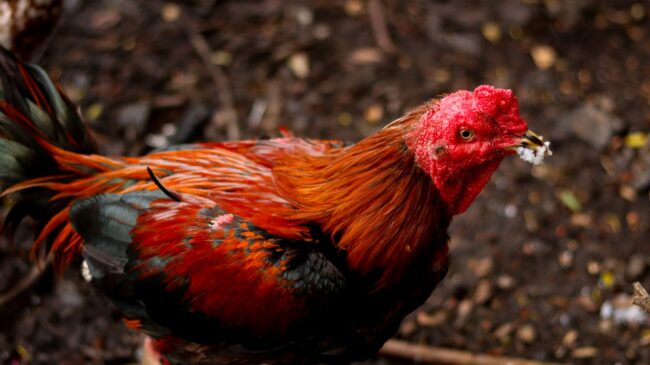Table of Contents
If you’re about to start a chicken farm or you’re just curious about the chickens, then you might be wondering if roosters can lay eggs or if they contribute to the egg-laying process in any way.
The short answer is no, roosters cannot lay eggs. Biologically, this is impossible. Only female chickens, called hens, are capable of this. This leads to another question – do you even need a rooster on your farm for hens to lay eggs?
While a rooster doesn’t lay eggs, it does play a role in the fertilization of the eggs. This article explains the topic in brief.
How Eggs Are Formed
Chicken eggs come in various shapes and sizes. They also vary in color from white to medium-brown. The most common types of eggs you’ll come across in the grocery store are medium or large.
Hens do not need roosters to lay eggs. They do so whenever the appropriate time comes. These eggs are different from the ones that are formed when the rooster is around. Basically, it’s an unfertilized egg that will never produce chicks.
Therefore, many farm owners get a continuous supply of eggs even when they do not have roosters on their farms.
Chickens need eight to ten hours of light per day to lay their eggs. And the lengthened daytime of warmer months is the perfect stimulant for them. To trick the hens to produce eggs all year round, farm owners employ artificial lighting systems.
Do Roosters Play a Role in Egg Formation?
Roosters are not directly involved with the actual formation of eggs. The eggs can develop, yolk and shell included, without a male chicken in sight. But they’ll stay unfertilized. This is the only extent to which a rooster is involved with eggs – he can fertilize eggs by mating with a hen.
The reproductive organ of the chickens is the cloaca. It is the hole through which they urinate and defecate. And cloaca is also used to transfer sperm from the rooster to the hen, which then goes on to fertilize the eggs.
Chickens mate between 20-30 times a day, and that’s enough to successfully transfer the sperm.
Do Chickens Get Pregnant?
Even if there’s a transfer of sperm, it does not mean that the rooster will always manage to impregnate the hen. As it happens, sometimes the mating is successful, and sometimes, it’s just not. The hen will lay eggs that are either fertilized by the rooster’s sperm or unfertilized if the mating was unsuccessful.
The unfertilized eggs are the ones that make it to the grocery stores. They’re produced on a large-scale year-round and are meant for selling purposes. Fertilized eggs are meant for breeding and growing a farmer’s flock of chickens.
Hens will sit on fertilized eggs to warm and hatch them. The most important condition for eggs to hatch is that the temperature should be 99 degrees F for at least 24 hours straight. The body temperature of the hen is ideal for this.
So Why do People Keep Roosters?
Now that you know roosters are not involved in the egg-making process (not at least the fertilized ones), why do we even bother raising roosters? They do not even lay eggs themselves.
The primary reason why farm owners raise roosters is to keep the numbers increasing. When a rooster is around, hens are more likely to lay fertilized eggs, which will hatch into more chickens. Without a rooster, fertilization and reproduction cannot happen, the numbers will decline, and you’ll see a reduction in your flock size.
The second reason why owners keep roosters is that they protect the flock from predators. They fight against other bird species, even hawks, that try to attack the hens and chicks. Roosters are very protective over their families!
The third reason people keep roosters is for meat. They do not have as much meat as hens but for some people, they make a good source of meat nonetheless.
A Quick Summary
So roosters do not lay eggs. Their role is only to fertilize the eggs that will later hatch into chickens.
Hens, irrespective of whether there’s a rooster around, will lay eggs. When the eggs are unfertilized, they can only be used for human consumption. Fertilized eggs can either be used for consumption or for raising chicks.

